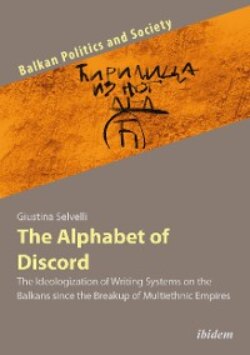Читать книгу The Alphabet of Discord - Giustina Selvelli - Страница 9
1.4 Semiotic and relational aspects of alphabets and nationalism
ОглавлениеIf we intend to consider writing systems as symbols of ethnic (and/or national) identity, we must necessarily note that symbols do not exist in themselves: rather, they represent “meanings” according to specific needs and intentions and for a particular audience. Culture, conceived in the form of “webs of significance” (Geertz 1988: 11 [1973]), reveals itself in its essentially semiotic nature. Consequently, it can only be understood through an interpretive analysis that searches for the meanings it expresses for those who “inhabit” it. By applying this theory of a semiotic nature to the phenomena of the ideologization of alphabets, I attempt to understand the meaning that the various writing systems embody for their respective societies. Ideology itself, conceived according to the Geertzian theory, is but one cultural system with its own specific language to analyze.
Hence, in order to reconstruct a “framework of meaning” (in the semiotic sense; see Lotman 1985) for the societies in question, I insist on the need to take into account a plurality of contexts: national, socio-cultural, political (and geopolitical), international, as well as minority and even individual ones. The meaning of a given phenomenon can be deduced from the way it is positioned “systemically” (cf. Bateson 1977 [1972]) in relation to other semiotic objects: the (symbolic) meaning of certain events, phenomena and cultural elements thus corresponds to the position they occupy in the structure of their societies.
In this process, it should be noted how the historiographies of the Balkans turn out to be “still predominantly traditionalist and nationalist” (Daskalov & Vezenkov 2015: 1), perpetuating narratives that tend to overlook the contribution and role of neighboring countries in their history and cultural development, in a perspective we might define as “anti-contextual.” For this reason, I have attempted to take a completely opposite perspective in this work, trying to combine as many elements as possible in an overall view to define the complex historical and cultural context of interest.
Indeed, I believe that on a methodological level it is essential to approach the history of Southeast Europe from a relational point of view, since much of this territory has followed a common historical pattern of development. It would be unnatural and counterproductive to isolate particular countries, nations or ethnic groups in the process of analysis: what is needed, therefore, is a contextual or “ecological” approach (cf. Barth 1969: 19), which can also bring advantages when applied at the linguistic level.6 As has been remarked: “[i]t is only possible to understand the South Slav lands by paying attention to the context within which they are situated. The trajectory of their development needs to be explained in relation to wider processes, involving neighbouring states, the Mediterranean region, the continent of Europe as a whole and indeed the world” (Allcock 2000: 13).
1 In relation to this, it is interesting to note the following: “In fact, minority nationalism in the Balkans is perceived solely as exclusive majority nationalism in an embryonic stage” (Ivanov 2007).
2 He also developed the fields of sociolinguistics and ethnolinguistics in Italy.
3 There is also the field of the so-called “ethnography of writing,” which is closely related to the anthropology of writing. See, for example, Mancini & Turchetta 2014.
4 Certainly, even in countries using the Latin alphabet, there can be cases of disputes involving the spelling of the language. An important case is the opposition to the proposals in the 1990s concerning the modification of certain letters of the German alphabet (cf. Johnson 2005: 1-6). Furthermore, as far as Turkey is concerned, we can recall the value assumed by the three forbidden letters of the Kurdish alphabet in recent years in conjunction with the struggle for recognition of the Kurdish cultural identity in the country. Basically, it can be seen that, in a way similar to alphabetical changes, spelling reforms are not easily accepted, especially in the context of communities using highly standardized languages (cf. Gundersen 1977). However, spelling debates are generally quite different from script debates, where much more is at stake, with far more significant implications.
5 One of the most important exceptions is Fishman 1977, a collection of studies devoted to various cases of alphabetical and orthographic reforms in languages from different parts of the world.
6 For example, in the consideration of the so-called “Balkan Sprachbund.”
